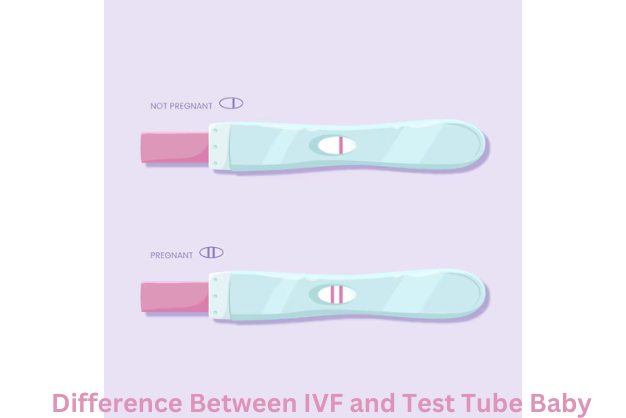What is the Difference Between IVF and Test Tube Baby?
When exploring fertility treatment options, terms like "IVF" and "test tube baby" often come up. Understanding the difference between these terms is crucial for anyone considering fertility treatments. Let's delve into what IVF and test tube baby mean, their processes, and their significance in the journey to parenthood.
Understanding IVF (In Vitro Fertilization)
In Vitro Fertilization (IVF) is a widely used assisted reproductive technology (ART) where an egg is fertilized by sperm outside the body, in a laboratory dish. The term "in vitro" means "in glass," indicating that fertilization occurs in a controlled environment rather than inside the human body.
The IVF Process:
Ovarian Stimulation: The process begins with stimulating the ovaries to produce multiple eggs using hormonal medications.
Egg Retrieval: Once the eggs mature, they are retrieved from the ovaries through a minor surgical procedure.
Fertilization: The retrieved eggs are mixed with sperm in a laboratory dish to facilitate fertilization.
Embryo Culture: Fertilized eggs (embryos) are cultured for a few days in the lab.
Embryo Transfer: One or more healthy embryos are selected and transferred into the woman's uterus.
What is a Test Tube Baby?
The term "test tube baby" is a colloquial phrase that was popularized in the late 1970s and 1980s when the first successful IVF baby, Louise Brown, was born. It refers to a baby conceived through IVF. Despite the term, no actual test tubes are involved in the process; instead, petri dishes are used for fertilization.
Comparing IVF and Test Tube Baby
Terminology:
- IVF is the medical term for the process of fertilization outside the body.
- Test Tube Baby is a non-medical term that refers to a baby born as a result of IVF.
Process:
Both terms describe the same process of fertilizing an egg outside the body and transferring the resulting embryo into the uterus.
Perception:
- IVF is often used in clinical and scientific contexts.
- Test Tube Baby is more commonly used in everyday language and media.
Significance of IVF at New World Fertility Centre
At New World Fertility Centre in Delhi, we specialize in providing advanced IVF treatments to help couples achieve their dream of parenthood. Our state-of-the-art laboratory, experienced medical team, and compassionate care ensure the highest chances of success.
Why Choose New World Fertility Centre?
Expertise: Our team of fertility specialists, led by Dr. Apoorva Mishra, has extensive experience in IVF and other fertility treatments.
Advanced Technology: We use the latest technology and techniques to enhance the success rates of IVF.
Personalized Care: We provide individualized treatment plans tailored to each couple's unique needs.
Comprehensive Support: From initial consultation to post-treatment care, we offer comprehensive support throughout your fertility journey.
Conclusion
In essence, IVF and test tube baby refer to the same process of assisted reproduction. IVF is the technical term, while test tube baby is a popularized phrase. Understanding these terms helps demystify the process and allows couples to make informed decisions about their fertility treatment options.
At New World Fertility Centre, we are committed to guiding you through every step of your fertility journey with expertise, care, and compassion. If you have any questions or are considering IVF, don't hesitate to contact us for more information or to schedule a consultation.
FAQ
1. What is IVF?
In Vitro Fertilization (IVF) is an assisted reproductive technology where an egg is fertilized by sperm outside the body, in a laboratory setting. The fertilized egg (embryo) is then transferred to the woman’s uterus to establish a successful pregnancy.
2. What does "test tube baby" mean?
"Test tube baby" is a colloquial term that refers to a baby conceived through the process of IVF. Despite the name, fertilization actually occurs in a petri dish, not a test tube.
3. Are IVF and test tube baby the same thing?
Yes, both terms refer to the same process of fertilizing an egg outside the body and transferring the resulting embryo into the uterus. "IVF" is the medical term, while "test tube baby" is a popularized phrase.
4. How does the IVF process work?
The IVF process involves several steps:
- Ovarian Stimulation: Hormonal medications are used to stimulate the ovaries to produce multiple eggs.
- Egg Retrieval: Mature eggs are collected from the ovaries through a minor surgical procedure.
- Fertilization: The retrieved eggs are mixed with sperm in a laboratory dish for fertilization.
- Embryo Culture: The fertilized eggs (embryos) are cultured in the lab for a few days.
- Embryo Transfer: One or more healthy embryos are selected and transferred to the woman’s uterus.
5. Is the term "test tube baby" still commonly used?
While the term "test tube baby" was widely used in the past, it is less common today. Medical professionals and patients usually refer to the procedure as IVF.
6. Is IVF safe?
IVF is generally safe, but like any medical procedure, it carries some risks, including multiple pregnancies, ovarian hyperstimulation syndrome (OHSS), and complications from egg retrieval. It is important to discuss these risks with your fertility specialist.
7. Who can benefit from IVF?
IVF can benefit couples with various fertility issues, including blocked fallopian tubes, male factor infertility, unexplained infertility, and age-related infertility. It is also an option for same-sex couples and single individuals wishing to conceive.
8. What are the success rates of IVF?
The success rates of IVF vary depending on factors such as the woman’s age, the cause of infertility, and the clinic’s expertise. At New World Fertility Centre, we use advanced techniques to maximize success rates.

 Jan-09-2026
Jan-09-2026